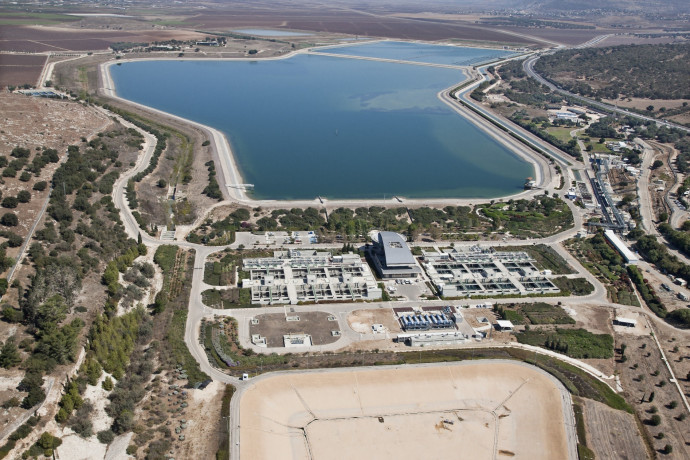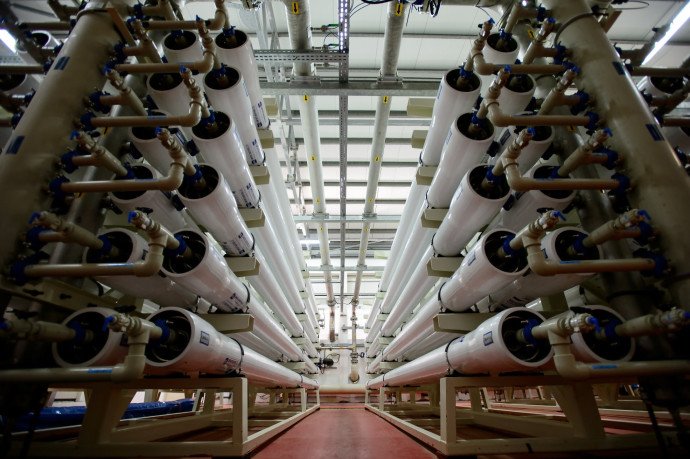For years, Israel has been known worldwide as the leader in water, agriculture and energy innovation. This is largely due to Mekorot, Israel’s national water company, which uses advanced technologies that attract the attention of water corporations and organizations from around the world.
Mekorot is responsible for the Israeli water sector. Throughout the year, dozens of delegations from various countries, such as the United States, Germany, Italy and Australia, come to Israel to learn from Mekorot’s Innovation Department about the advanced developments that help Israel lead in desalination and proper energy management of the water sector. Dudi Balsar, head of Mekorot’s Innovation Unit, points out that the climate crisis, which has intensified in recent years, alongside the need for energy efficiency, requires those countries to learn the do’s and don’ts from Israel, at the informational level and on the business and managerial side.
“The Mekorot Innovation Unit conducts several areas of activities,” explains Balsar. “The first is investment in start-ups and location of technologies in all areas relating to the water and wastewater treatment industry. This includes technologies in the areas of energy, agriculture, food and more – Mekorot creates a large ecosystem.

“For the past three years, we have been functioning as a kind of investment fund,” he adds. “We locate the start-ups and technologies relevant to Mekorot’s needs and invest in them. We have already investigated more than 300 technologies and start-ups, and by the end of the year, we will invest in 13 of them.
“We are setting up an ecosystem of technologies and companies that deal with water and wastewater,” he states.
“This is something that did not exist here until today. In the beginning, we collaborated with huge companies such as Microsoft, Amazon and other partners, in order to bring new talent and technologies to the world of water, such as the use of Big Data, artificial intelligence, machine learning and more. It was a strategy that we developed for three years, and now it’s coming to fruition with a number of our investments, primarily in Big Data.”
Research & Development
The second area of interest in which Mekorot’s Innovation Unit is involved is research and development. According to Balsar, the company has been operating in the field for over a decade and employs researchers with degrees in chemistry, biology, bacteriology and more, who are working in cooperation with leading research institutes and bodies in Israel and around the world. “Among the entities we work with are the Weizmann Institute, the Volcani Institute, the Defense Ministry, the IDF, the US Department of Energy and a host of other world-renowned organizations and academic institutions,” says Balsar.
'Mekorot’s goal? To optimize energy consumption and improve the country’s water quality'
“We are creating large teams to investigate the issues in depth and produce studies that can be tested in the field,” he explains. “We have established a research and development center for wastewater at the Shafdan [Dan Region Wastewater Treatment Plant], which is the first of its kind. Israel is considered a leader in the field, and a large part of its success is due to the innovative facility at Shafdan. Using a range of processes and advanced technologies, we take unusable water and return it to the aquifer (underground water reservoir), where it receives the minerals it needs, producing high-quality water. The same water returns to the desert in the South and is used for irrigation in the Negev. This is a process unique to Israel, with the result that 90% of the wastewater returns to agriculture, which is unheard of in the world today.”
Another significant part is the development within Mekorot by the professionals employed in the Innovation Unit, alongside professional collaborations with companies and organizations. “We have quite a few partners in this, not only in Israel, but also with leading water companies in Morocco, Bahrain, the US and others. The bottom line is that the State of Israel has succeeded in building a unique and durable, sustainable water economy, and this is thanks to these technologies.
“Approximately 85% of the drinking water in Israel comes from seawater desalination, and the water for agriculture comes mostly from wastewater treatment,” Balsar points out. “We were able to meet the two biggest and most necessary requirements for water: drinking and agriculture. Add to this proper water sector management, with a low-to-zero-water leakage rate, and this creates the proper framework. In the past, it took long hours to transport water from the National Water Carrier to the customer’s home, but this time has been significantly shortened, using a significant amount of technology to make sure that the water is of the right quality and that it is treated properly.”
The Energy Market
Balsar explains that the development of the modern water sector is primarily built on desalination and proper wastewater treatment, and for this purpose, there is a need for technological tools to manage this operation using sensors, machine learning and artificial intelligence that can make critical decisions in command centers, and of course, provide cybersecurity. “We are considered a critical infrastructure and are under the National Cyber Directorate,” explains Balsar.” There are hundreds of thousands of hacking attempts every year, with every day there being an attempted attack by hostile elements. Mekorot is a world leader in everything related to cybersecurity regarding water infrastructure, and we have also invested in two cyber companies. Cyber is one of the example topics of interest to the Americans, who have started spending large amounts in this area.”

Mekorot invests in start-ups and technologies that help solve two critical problems in the water industry: energy efficiency and pollution. “In addition to the natural growth in the global population, there is also the problem of pollution of water sources due to environmental reasons such as flooding,” Balsar says. “This can disrupt the water sector. The system is constantly challenged to forecast these issues, predict demand and monitor the quantity and quality of the water. We do this by using sensors that help us manage the system effectively.
“Mekorot is the largest energy player in the country in terms of electricity usage,” Balsar notes. “We are speaking of water pump usage and transportation of water. One of the most important things for any country is to manage the energy sector wisely and implement renewable energies. We have installed solar panels in the national carrier, and use artificial intelligence that collects the data, runs various algorithms on it and gives us real-time recommendations on how to operate the pumps, which reduces our energy consumption.
'Water corporation delegations and a gamut of countries come to Israel to examine technologies developed by Mekorot’s Innovation Unit'
“We are always looking for relevant technologies, and we even develop them ourselves,” says Balsar. “Because we are a large company and an operational body with in-depth knowledge of the challenges and problems in the water market, quite a few start-ups contact us directly. However, we constantly keep our finger on the pulse, and every year we prepare a list of the urgent needs we need to deal with as a company, such as water pollution caused by the activities of the defense industries, oil leaks at sea, or pollution coming from the Palestinian Authority.
“Another challenge is the transition to digital and the need for different control devices to communicate with each other. We are planning to establish a central site in Rosh Ha’ayin that will control the entire system. We have answers to the various problems that challenge countries around the world. Not everyone has energy problems. Some need assistance with data, desalination and more. What is of interest to everyone is the field of wastewater, especially how energy is produced from them. For example, 80% of the energy in our wastewater facility comes from biogas produced from the wastewater in the facility.
“Climate change is forcing countries to think about things differently,” Balsar concludes. “Italy, for example, is experiencing an extreme drought that has shown that there is a limit to the level of supply, and they understand they will have to change the way things are conducted. This puts water corporations and countries under pressure. They understand that they need to establish a different water sector and not rely on the existing reservoirs. When they see Israel, a country that is mostly desert, managing to create a year-round supply of water for itself, primarily because of the desalination plants, together with a sophisticated transport network that can efficiently transport the water from north to south and from east to west, they understand that this is an example of how to build a sustainable water economy that knows how to deal with the current challenges and those that will come in the future.”
Translated by Alan Rosenbaum.
This article was written in cooperation with Mekorot.
